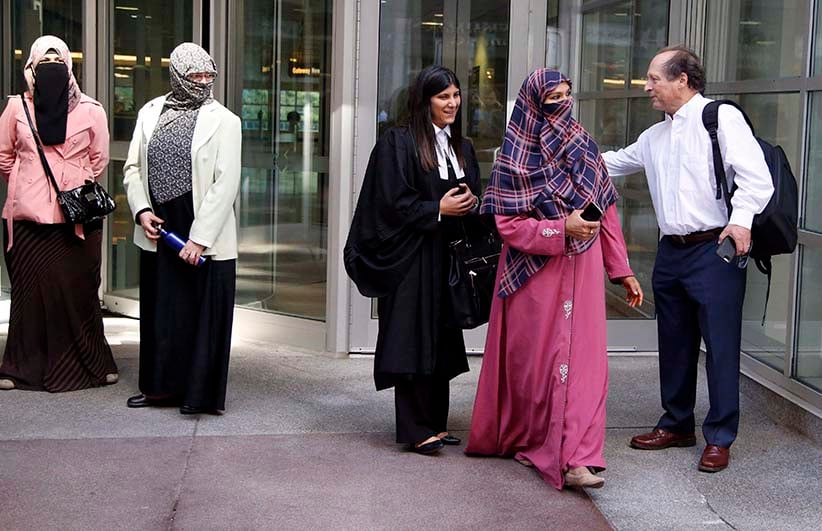Election Issues 2015: A Maclean’s primer on the niqab
Find out where each party stands on the Islamic veil.
Zunera Ishaq, second from right, leaves the Federal Court of Appeal after her case was heard on whether she can wear a niqab while taking her citizenship oath, in Ottawa on Tuesday, September 15, 2015. (PATRICK DOYLE/CP)
Share

Of all the issues that got repeated attention during the 2015 election campaign, the debate over the niqab at citizenship ceremonies may have been the most surprising one. It is certainly the one that affects the least number of people in Canada: Citizenship and Immigration Canada told CBC News that only two women since 2011 had declined to go through their swearing-ins because they had to remove their face veils.
Zunera Ishaq decided to fight the ban and won twice, at the Federal Court and the Federal Court of Appeal, where the judges ruled that the citizenship minister didn’t have the authority to implement the ban. Canadian law gives citizenship-court judges the discretion to allow the greatest possible religious freedom in swearing the oath.
CONSERVATIVES USING VEIL AS A WEDGE
The niqab is a religious head covering worn by some Muslim women that reveals only the eyes. It’s a controversial item, with opponents arguing it’s a cultural article and not one required as part of Islamic practice. Still, some devout Muslims believe it is required as part of their faith.
The Federal Court of Appeal decision, which came in the middle of the election campaign, gave the Conservatives the chance to reignite the debate. The NDP, Liberals and Greens say the Conservatives are using it as a wedge against the other parties. The Bloc Québécois sides with the Conservatives on this, which has led to speculation it’s the reason some polls suggest the NDP has lost support in Quebec recently. The ban is, in fact, popular: Polls show most Canadians support it. But, as Aaron Wherry wrote last week, that popularity is based on bad information, with respondents apparently assuming that women wearing veils for the ceremony don’t have to lift their veils at all to be identified. In fact, they must show their faces to an official, privately, to identify themselves.
WHERE THE PARTIES STAND
Conservative: The Tories are asking the Supreme Court for leave to appeal the Federal Court of Appeal decision, a move legal experts say is likely to fail. The Federal Court denied the government’s request for a stay on the decision, which would have prevented Ishaq from being sworn in as a Canadian and left her ineligible to vote in the Oct. 19 election.
Campaign pledges:
—Conservative Leader Stephen Harper told CBC News his party is looking at legislation to ban the niqab for federal public servants. He pointed to existing legislation in Quebec.
—The Conservatives would introduce legislation to ban face coverings at citizenship swearing-in ceremonies.
NDP: Leader Tom Mulcair suggests the Conservatives are abusing the issue. He says face coverings make him uncomfortable, but that it’s not up to the government to dictate what someone can wear. “What you’re trying to do, above all, is hide your record. You are using it as a weapon of mass distraction,” Mulcair said to Harper in the last federal leaders’ debate. “You are playing a dangerous game of the kind I’ve never seen in my life, and I never thought I’d see a prime minister play it.”
Campaign pledges:
—The NDP would end the government’s court challenge of Ishaq’s case.
Liberal: Leader Justin Trudeau accuses Harper of being a divisive politician, including pitting “so-called ‘old stock’ Canadians versus newcomers” and says Harper’s “first instinct is to appeal to the worst instincts.” He has stuck to his theme of protecting Canadians’ rights, telling Harper at last Friday’s French-language debate, “You have more men in your caucus who are anti-abortion than there are women wearing the niqab in Quebec.”
Campaign pledges:
—The Liberals would end the government’s court challenge of Ishaq’s case.
Green: Leader Elizabeth May calls the discussion over face coverings at citizenship ceremonies a false debate, and says it helps Canadians to know the facts of the case. She is also concerned about the amount of money spent fighting the court challenge.
Campaign pledges:
—The Greens would end the government’s court challenge of Ishaq’s case.
EXPERT OPINION
“Some persons are making political hay with [the niqab] and other persons are somewhat more principled. I expect that the persons making political hay actually believe that this is a, quote-unquote, “barbaric practice,” and I do wish that they would . . . talk to some of these women and they would be disabused of some of these ideas.”
—Lynda Clarke, professor of religion and Islam at Concordia University, and author of a study on women in Canada who wear the niqab
GO DEEPER
- Behind the veil: Zunera Ishaq on her controversial niqab
- What’s really behind the niqab poll results?
- Tom Mulcair took a bold stand on the niqab. It may ruin him
SEE MORE PRIMERS
[widgets_on_pages id=”Election”]